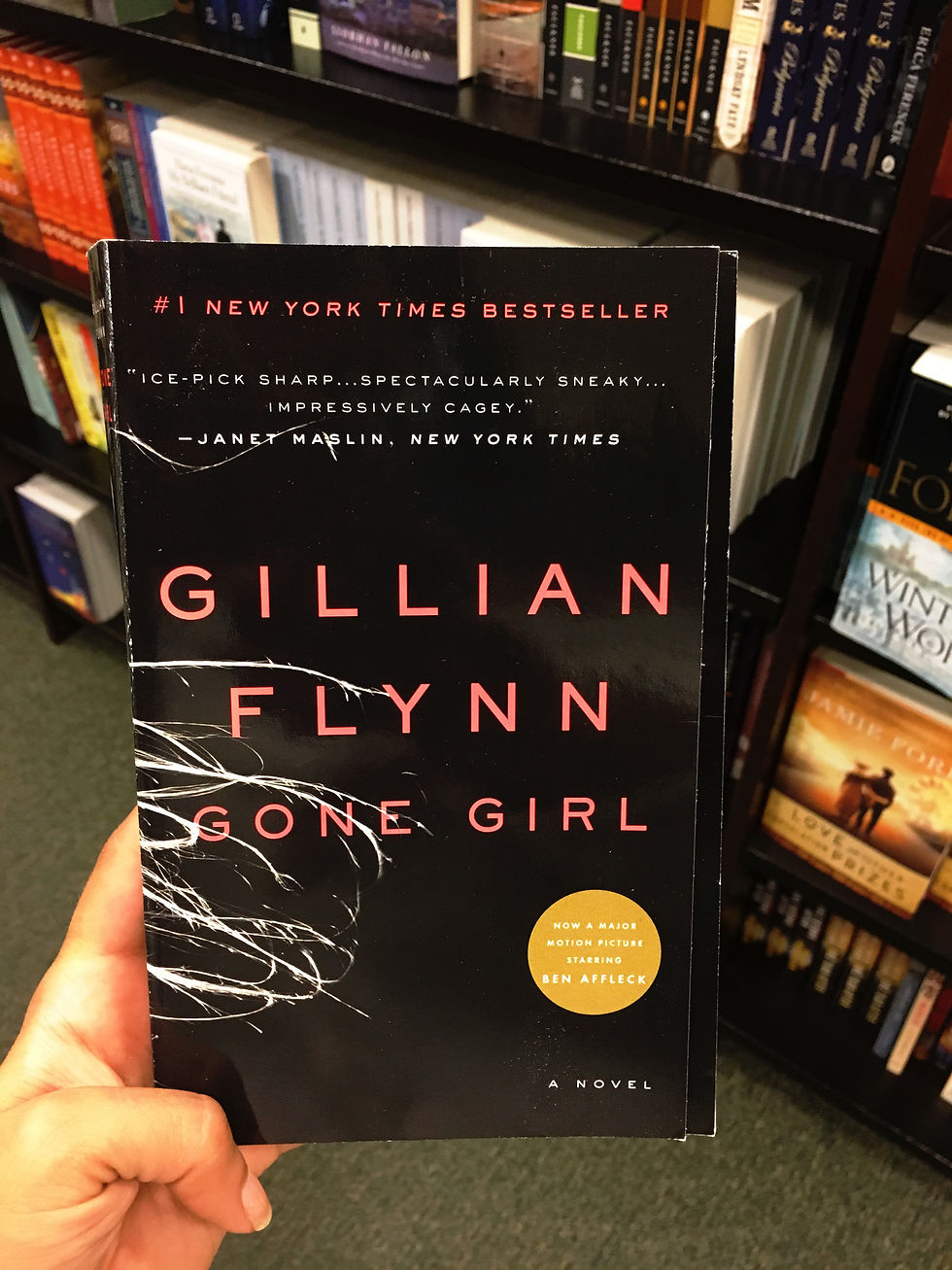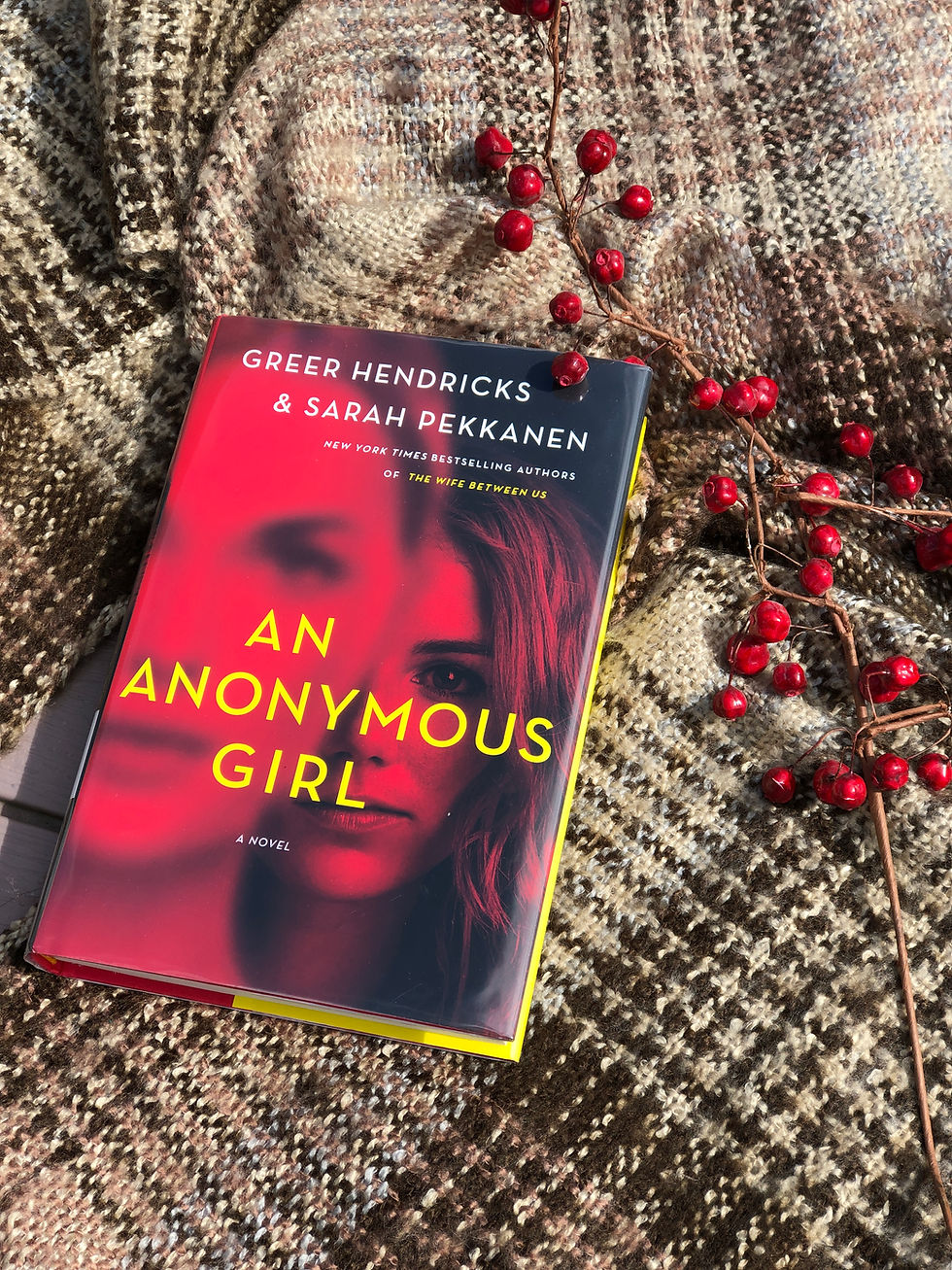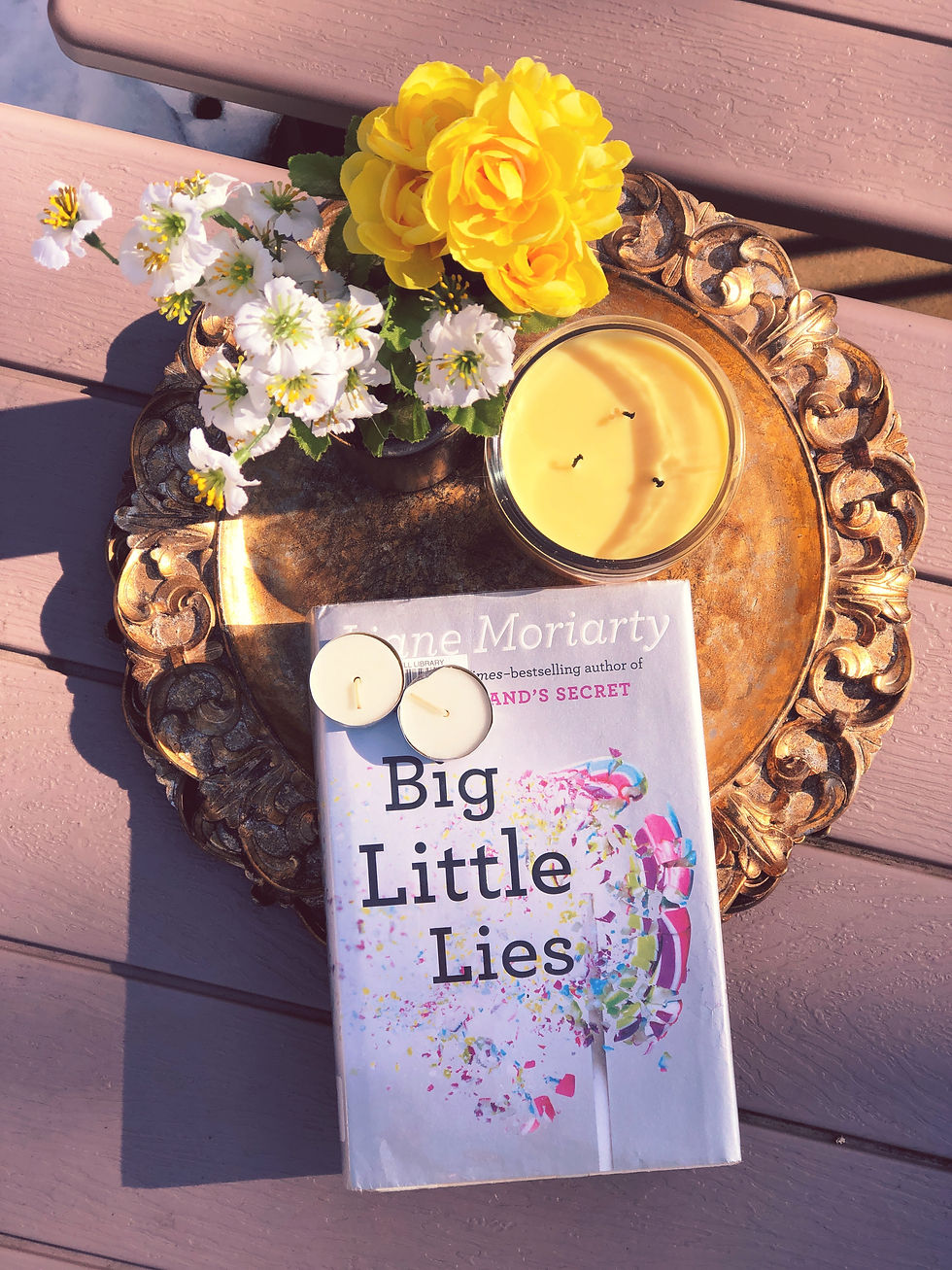Gone Girl: The Book I Almost Quit
- Gulrukh Haroon
- Feb 4, 2018
- 7 min read
(Jan 4th)
I tried to like this book. I really, really tried.

Flynn takes an interesting, and I’ll even go as far as saying a much-needed approach to the issue of marriage in the infamous Gone Girl. Instead of fantasizing it, she decides to envelop a “murder mystery” within the realms of a devastatingly failing marriage of a golden boy and golden girl, slipping off the edge of the cliff.
Structurally, I rather enjoyed the layout of the book. The constant time shifts between the Nick’s current reality and Amy’s previous diary entries allow the reader peel back the layers of the characters involved slowly-- it has a similar effect as peeling off a bandage one pore at a time, every second more revealing, until it's finally gone and you see the whole picture. As with any novel, you’re meant to sympathize with the characters, until you find a reason not to. The issue is I found both “protagonists” mildly repulsive. Perhaps this was meant to be ironic or stimulating in some way. But it just wasn’t my cup of tea.
A man’s wife goes missing on their five year anniversary. One would expect a story like this to evoke strong emotional connections, but rather than my attachment increasing to the characters as I read, I become more disgusted with every page. The two are equally ludicrous, both with deeply seeded parental issues and attachment issues and emotional issues- the list never ends. What’s worse is that neither character gives the reader any footing. I am happy to connect with a character, in fact, that’s half of the fun of reading. Give me a character I can root for, give me someone whose side I’m on.
Instead, I’m stuck in a miserable world where both the husband and wife leave everything to be desired and I honestly couldn't care less if they end up together or if she’s dead or alive or if he killed her or not.
That’s when you know its a flop. Even the suspense of the mystery-- the itch to just know the whole story, to find out if she’s alive or dead, who forced her to leave, or where did she go, or will they end up together-- if even the integral plot questions from the story arch aren’t enough to keep you reading, you really have nothing left.
I’m not the kind of person that quits things. I’m the kind of person that sees things through. I was originally listening to this book as an audiobook-- it was the first audiobook I hated. The actors read like robots, no emotions, no sincerity. It was awful. I had to speed up the voices to just get through the material faster. Often, I didn’t want to listen to the book on commutes, I fiddled with the radio instead just to avoid listening to their treacherous voices. I was 5 hours into the 15 hour saga and I finally thought maybe if I pick up the physical copy it’ll be better.
And it was. For a bit.
I was able to get through material much faster with the physical book, not distracted by the terrible reading by the actors in the audiobook. But reading the book didn’t solve the problems I described earlier: that I simply didn’t care about the characters. Not even a side character! Not the detectives, Amy’s parents, Nick’s twin sister, the mistress, the Blue Book boys, the best friend and mother of three Noelle-- literally nobody.
When I reached the exact halfway point, in which Amy’s Diary catches up to the present where she goes missing and she starts to reveal the truths of the mystery I was still riding the train for, I decided I didn’t even care enough to find out. There was too much disappointment. Too much melodrama. Too little substance or emotional value. Heck, I would have stuck around if it was at least well written, or in a good setting, or if there was some historical accuracy. But no- there was sadly nothing that could even remotely keep me going through this miserable experience.
So, I had to quit. Something I can only say I’ve done with three other books in my lifetime.
(Jan 12th)
So, against all odds, I finished Gone Girl. It was difficult, but I did it. So now I can write a more comprehensive review.
Before I detail how I felt after finishing the book, let me just say that my changed opinion will do little to discredit what I said earlier. If a book isn’t able to draw your attention until 230 pages in, you have a problem. There are few people that will be willing to suffer until then with the hopes that it might just turn around.
I had no intention of continuing to read the book. I returned it on Audible and used the credit I had to purchase The Chickenshit Club by Jesse Eisinger. However, upon going to sleep that night, I saw that my copy of Gone Girl was still in my Audible library. I clicked it to see if it would disappear, but instead it started to play, and, pursuant to my curiosity I listened.
Plot twist: it got interesting.
Until this point in the book, Flynn had developed characters I mostly despised, with secondary characters who were either entirely irrelevant or grotesquely underdeveloped, with a plot that also felt too forced. But now, with half of the story still untold, some unanswered questions arose. I finally had a reason to continue reading.
In fact, part of my reason for hating Amy came to light. With the revelation that the diary entries were written exclusively as a part of a well-thought out, extravagantly detailed revenge plan, I suddenly felt the intrigue I had been waiting for. I hated “Amazing Amy”, the “cool girl” as she puts it, the Amy that I got to know through the first half of the book via diary entries. She embodies every character trait that I would hate for a female protagonist- she’s overly naive, seems to have no self respect, she’s entitled and arrogant and really unremarkable. Finally, though, Amy is revealed to be a different person than the character she created. The real reasons for the breakdown of her and Nick’s marriage are slowly revealed.
Finally, I had a reason to linger on in this unpalatable world.
Here comes the bad news.
Even though I had reason to continue reading, and every once in a while I had a shred of remorse for the characters and the terrible situation they were in, the end of the book was tragic in more ways than one. Although the characters go through an evolution of sorts, you end up realizing that neither of them actually grows throughout the process. Nick has always been the same. Amy, the Amy that we knew from the diaries, at least, never existed in the first place. So any change that we see between Diary Amy and Real Amy (whom I refer to as Psycho Amy) isn’t really a change. In this book, rather than an evolution we see two fake personalities, and by the end, those faux shells are broken and their true selves are revealed. They neither grow nor learn from their experiences.
Amy was willing to kill a man who helped her when she lost all of her money. She wasn’t just willing to kill, she did kill. Nick made video after video trying to convince the world and her wife that he loved her, all the while fantasizing of the way his hands would feel when he finally choked the last breath out of her.
This book is terrifying. I am more willing to believe that witches and wizards exist than believe that this story could be true. There is more realism in supernatural fiction tales than there is in this supposedly realistic portrayal of a failed marriage. The fact of the matter is the characters are so unreasonably absurd that the plot is largely unfathomable, and therefore almost unreadable.
There is no justification for either of their actions throughout the novel. Though there is more of an explanation by the end, there is zero justification. Amy and Nick are repulsive individuals. They are toxic toward each other, as well as the world around them. They use people like tools. They act as though anyone and everyone they interact with is disposable. I am a firm believer that there is good in every person. Even somebody on Death Row could perform a truly selfless act for no reason other than a shred of goodness in their heart. For every terrible thing a person has done, I generally believe that there are many more good things that that same individual has done for others and the world in general.
In this book, though, I struggled to strike that balance in either of the lead characters. While I commend Flynn for not playing it safe-- to write a novel about a truly devastating marriage, a book without a happy ending-- I struggle to find myself enlightened after reading it. Instead, I count my blessings that my life does not in any way resemble any of the events that took place in North Carthage, Missouri.
I cannot say, however that I didn’t learn anything. I will work hard every day of my life to make sure that there is never a day that I look in the mirror and find myself resembling Amy Elliot Dunne in any way, shape or form. I don’t ever want to go SO FAR in my quest to be proven “right” or “perfect” that I am willing to sacrifice every ounce of my humanity and decency. I don’t ever want to become so set on revenge that I am unable to let things go and simply live. Amy is everything I hope that I never am. And so is Nick.
So thank you, Gyllian, for creating such disgusting characters that can be examples of who NOT to be, no matter how bad things get.




Comments